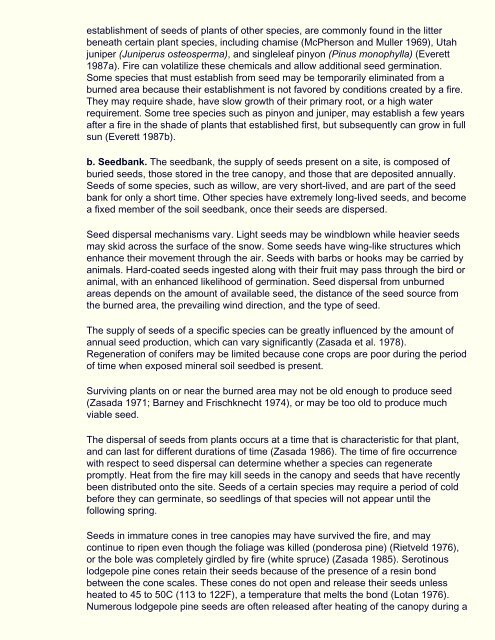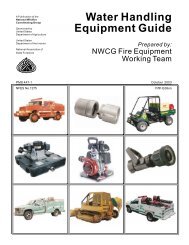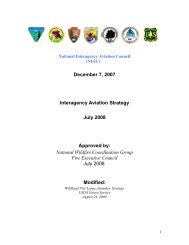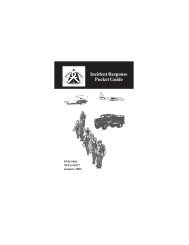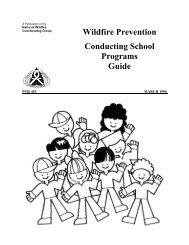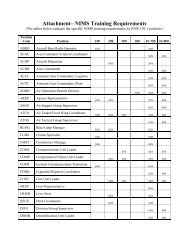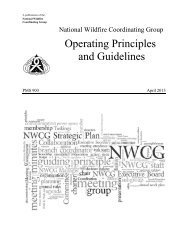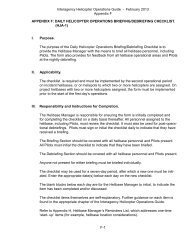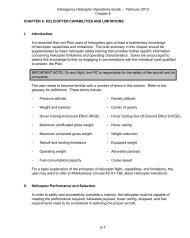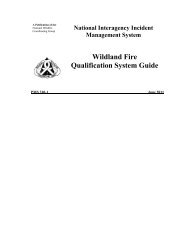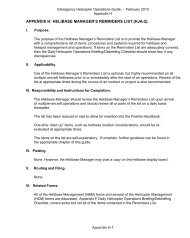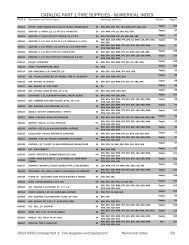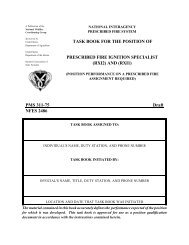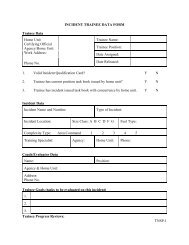FIRE EFFECTS GUIDE - National Wildfire Coordinating Group
FIRE EFFECTS GUIDE - National Wildfire Coordinating Group
FIRE EFFECTS GUIDE - National Wildfire Coordinating Group
You also want an ePaper? Increase the reach of your titles
YUMPU automatically turns print PDFs into web optimized ePapers that Google loves.
establishment of seeds of plants of other species, are commonly found in the litter<br />
beneath certain plant species, including chamise (McPherson and Muller 1969), Utah<br />
juniper (Juniperus osteosperma), and singleleaf pinyon (Pinus monophylla) (Everett<br />
1987a). Fire can volatilize these chemicals and allow additional seed germination.<br />
Some species that must establish from seed may be temporarily eliminated from a<br />
burned area because their establishment is not favored by conditions created by a fire.<br />
They may require shade, have slow growth of their primary root, or a high water<br />
requirement. Some tree species such as pinyon and juniper, may establish a few years<br />
after a fire in the shade of plants that established first, but subsequently can grow in full<br />
sun (Everett 1987b).<br />
b. Seedbank. The seedbank, the supply of seeds present on a site, is composed of<br />
buried seeds, those stored in the tree canopy, and those that are deposited annually.<br />
Seeds of some species, such as willow, are very short-lived, and are part of the seed<br />
bank for only a short time. Other species have extremely long-lived seeds, and become<br />
a fixed member of the soil seedbank, once their seeds are dispersed.<br />
Seed dispersal mechanisms vary. Light seeds may be windblown while heavier seeds<br />
may skid across the surface of the snow. Some seeds have wing-like structures which<br />
enhance their movement through the air. Seeds with barbs or hooks may be carried by<br />
animals. Hard-coated seeds ingested along with their fruit may pass through the bird or<br />
animal, with an enhanced likelihood of germination. Seed dispersal from unburned<br />
areas depends on the amount of available seed, the distance of the seed source from<br />
the burned area, the prevailing wind direction, and the type of seed.<br />
The supply of seeds of a specific species can be greatly influenced by the amount of<br />
annual seed production, which can vary significantly (Zasada et al. 1978).<br />
Regeneration of conifers may be limited because cone crops are poor during the period<br />
of time when exposed mineral soil seedbed is present.<br />
Surviving plants on or near the burned area may not be old enough to produce seed<br />
(Zasada 1971; Barney and Frischknecht 1974), or may be too old to produce much<br />
viable seed.<br />
The dispersal of seeds from plants occurs at a time that is characteristic for that plant,<br />
and can last for different durations of time (Zasada 1986). The time of fire occurrence<br />
with respect to seed dispersal can determine whether a species can regenerate<br />
promptly. Heat from the fire may kill seeds in the canopy and seeds that have recently<br />
been distributed onto the site. Seeds of a certain species may require a period of cold<br />
before they can germinate, so seedlings of that species will not appear until the<br />
following spring.<br />
Seeds in immature cones in tree canopies may have survived the fire, and may<br />
continue to ripen even though the foliage was killed (ponderosa pine) (Rietveld 1976),<br />
or the bole was completely girdled by fire (white spruce) (Zasada 1985). Serotinous<br />
lodgepole pine cones retain their seeds because of the presence of a resin bond<br />
between the cone scales. These cones do not open and release their seeds unless<br />
heated to 45 to 50C (113 to 122F), a temperature that melts the bond (Lotan 1976).<br />
Numerous lodgepole pine seeds are often released after heating of the canopy during a


